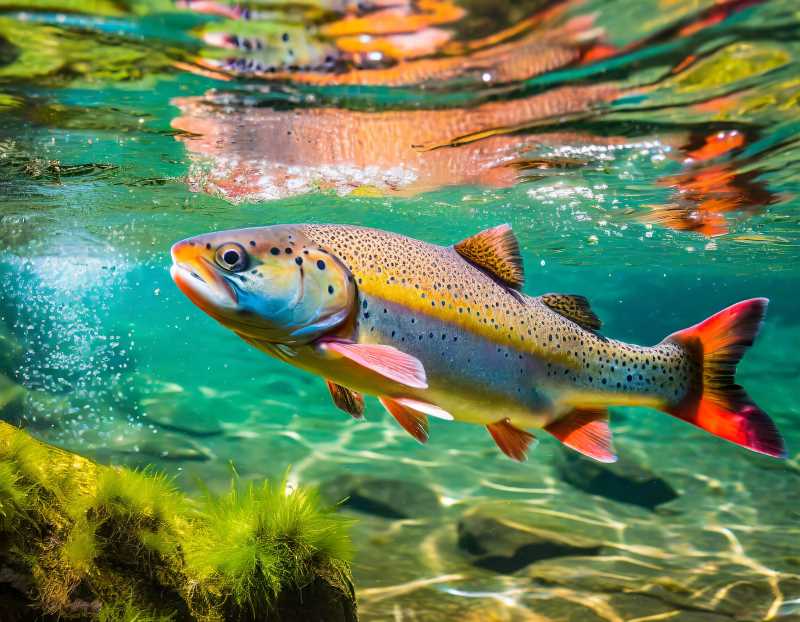The Future of Fish Feeds with Plant-Based Innovation
Mexican scientists ditch fishmeal for veggie-powered trout feed, aiming to curb overfishing and create a sustainable future for aquaculture. The plant-based diet shows promise in early trials, paving the way for a greener, tastier plate of fish.

The rainbow trout, a gleaming jewel gracing mountain streams, has long captivated anglers and gourmands alike. But beneath its shimmering scales lies a hidden secret: a dependence on a resource increasingly under strain – fishmeal. This critical protein source, derived from wild fish, faces a precarious future, driven by overfishing and environmental concerns.
Enter scientists at the Facultad de Estudios Superiores (FES) Iztacala, UNAM, Mexico, who are pioneering a revolutionary solution: a balanced, plant-based diet for rainbow trout. This isn't just about swapping out one ingredient for another; it's about reimagining the future of aquaculture, one algae-infused pellet at a time.
Luis Héctor Hernández Hernández, a specialist at FES Iztacala's Laboratory of Aquaculture Production, paints a stark picture. “Fishmeal is obtained from a non-renewable source,” he explains. “The fisheries are reaching their limits, and soon, there won't be enough fish to keep up with the demand.” This unsustainable practice threatens marine ecosystems and pushes up prices and fuels competition among fish farmers.
The consequences are far-reaching. As Hernández Hernández points out, “trout in their natural habitat are carnivores, but in farms, they depend on fishmeal as their main protein source.” This paradox, where farmed fish rely on their wild counterparts for sustenance, creates a critical dependence on a dwindling resource.
Driven by this challenge, the team at FES Iztacala embarked on a quest for sustainable alternatives. Their initial experiments, dating back to 2005, explored various options. “We tested several products,” Hernández Hernández recalls, “and finally patented a formulation based on soy protein and spirulina powder.”
But their ambition stretched further. They sought to unlock the potential of readily available, entirely plant-based protein concentrates. Enter peas, rice, corn, and soon, soy and amaranth – a veritable vegetarian feast for the finned.
Balancing Nutrition and Growth
The team's focus isn't solely on replacing fishmeal; it's about ensuring optimal fish health and growth. Trout farmers, after all, prioritize a quick turnaround – getting their fish from hatchlings to market size within six to nine months.
To achieve this, the researchers meticulously monitor the impact of their plant-based diet. They compare the growth rates, nutritional profiles, and even the immune responses of trout fed their veggie concoction against those on the conventional fishmeal diet.
“We analyze gene expression related to growth and inflammation,” Hernández Hernández explains. “Certain vegetable meals, if processed incorrectly, can cause intestinal inflammation, hindering nutrient absorption and eventually leading to disease.”
The team's efforts haven't gone unnoticed. Private, federal, and state fish farms have taken notice, with some trout showing a remarkable affinity for the plant-based diet. This year, with funding from the Consejo Mexiquense de Ciencia y Tecnología, the researchers embarked on a crucial project: selecting fish that thrive on their veggie meals.
By identifying these resilient individuals, the team aims to create a new generation of trout – one perfectly adapted to a plant-powered future. These “veggie-vorous” fish will not only grow well and resist disease but also be safe and delicious for consumers.
A Ripple Effect for Aquaculture
The implications of this research extend far beyond the rainbow trout. If successful, it could serve as a blueprint for transitioning other farmed fish species to plant-based diets. This, in turn, could significantly reduce pressure on wild fish populations, promote sustainability in aquaculture, and even lower production costs.
Of course, challenges remain. Scaling up production, ensuring nutrient balance, and adapting the formulation to different fish species are all hurdles to overcome. But the team at FES Iztacala is undeterred. With each pellet of plant-based goodness, they are not just feeding fish; they are nurturing a future where aquaculture thrives harmonizing with the environment, one delicious bite at a time.
So, the next time you savor a succulent rainbow trout, remember – it might just be a product of a culinary revolution, swimming upstream towards a more sustainable future for our oceans and our plates.




